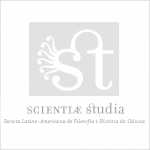Werner Heisenberg e a Interpretação de Copenhague: a filosofia platônica e a consolidação da teoria quântica
Vol. 8, No. 2 • Scientiae Studia
Autor: Anderson Leite, Samuel Simon
Resumo:
Este artigo discute o uso que Werner Heisenberg faz da filosofia grega clássica no âmbito dos debates acerca da teoria quântica realizados na primeira metade do século xx. Para esse autor, a ciência foi determinada pelo influxo de duas correntes de pensamento que surgiram na Grécia antiga: o materialismo e o idealismo. A partir de tal clivagem, Heisenberg fundamenta sua crítica aos opositores da Interpretação de Copenhague, além de justificar filosoficamente suas próprias teses sobre a mecânica quântica. Apesar de suas concepções filosóficas não serem passíveis de uma sistematização completa, a relação que Heisenberg estabeleceu entre a filosofia grega e os problemas da teoria dos quanta acabou por resultar em uma interpretação da realidade física na qual é predominante um platonismo e um incipiente estruturalismo matemático.
Abstract:
This article discusses Werner Heisenberg's use of ancient Greek philosophy in the debates about quantum theory that occurred during the first half of the 20th century. For Heisenberg, science was determined by two concurrent streams of thought that arose in ancient Greece: materialism and idealism. Starting from this separation, Heisenberg not only develops his criticism of the opponents of the Copenhagen interpretation, but also philosophically justifies his own theses regarding quantum mechanics. Although his philosophical conceptions are not themselves open to complete systematization, the relation that Heisenberg established between Greek philosophy and the problems of quantum theory finally resulted in an interpretation of physical reality, which is deeply marked by a kind of Platonism and an incipient mathematical structuralism.
DOI: http://dx.doi.org/10.1590/S1678-31662010000200004
Texto Completo: http://www.scielo.br/scielo.php?script=sci_arttext&pid=S1678-31662010000200004&lng=pt&nrm=iso&tlng=pt
Palavras-Chave: Mecânica quântica,Teoria quântica, Werner Hei

Scientiae Studia
Associação Filosófica Scientiae Studia - Revista Scientiae Studia
